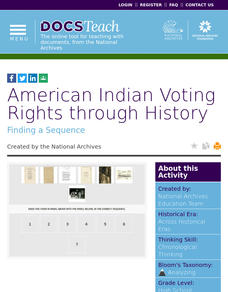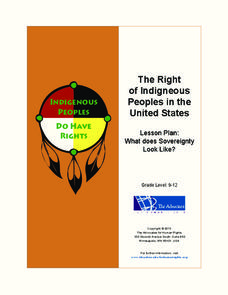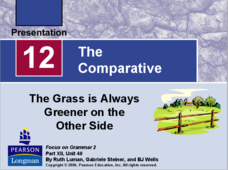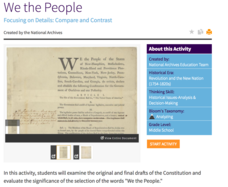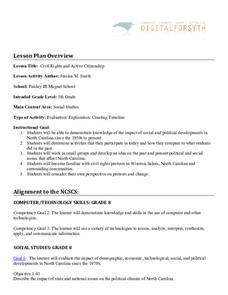Curated OER
Compare Fractions
In this comparing fractions practice worksheet, students sharpen their problem solving skills as they solve 6 story problems that require them to compare fractions.
DocsTeach
Comparing the Magna Carta and English Bill of Rights with the U.S. Bill of Rights
Just how alike are some historical documents? Discover the similarities between the Magna Carta and the United States Bill of Rights in a fast-paced activity. Historians learn the importance of both documents and the lasting impact they...
Newseum
Civil Rights: Chronicling the Movement
Scholars investigate events in the civil rights era in their community and develop a multimedia presentation of their findings. They compare local events with national events discussed on a NewseumED timeline.
DocsTeach
"We Are Badly in Need of a Breath of Fresh Air": A Letter to President Kennedy About LGBTQ+ Rights
The 1960s were a pivotal time for many Americans who had long been discriminated against. Scholars read a document addressed to President Kennedy in support of LGBTQ+ rights and why they are essential. The activity includes group...
DocsTeach
The Civil Rights Act of 1964 and the Equal Employment Opportunity Commission
1964: A victory for the civil rights movement! Scholars read a section of the Civil Rights Act of 1964 and discuss what affirmative actions means to them. The resource is a jigsaw activity, with each group focusing on one section of the...
DocsTeach
American Indian Voting Rights through History
Vote ... it's your right! An enlightening lesson examines the history of voting rights for Native Americans. Leaners analyze primary documents and place them in chronological order. Academics also create a list of other events that took...
Digital Public Library of America
Fannie Lou Hamer and the Civil Rights Movement in Rural Mississippi
Good primary resources, offering different perspectives on important issues and events, are hard to find. A packet of 12 primary source images, videos, audio recordings, records, and newspaper articles related to the 1960s civil rights...
DocsTeach
Analyzing a Letter About American Indian Voting Rights
An informative activity focuses on the law preventing Native Americans from voting until 1947. Scholars read documents from the Office of Indian Affairs, complete an online worksheet, and participate in group discussion. Academics learn...
Newseum
'The Press and the Civil Rights Movement' Video Lesson
Scholars watch a video featuring journalists who covered the civil rights movement, then respond to questions on a viewing guide. The video features interviews with participants and original news footage from the 1950s and 1960s. In...
Advocates for Human Rights
The Right of Indigneous Peoples in the United States
The sovereignty of U.S. Native American nations is the focus of a resource that asks class members to compare the Right to Self-Determination in the UN Declaration on the Rights of Indigenous Peoples with a fact sheet that details the...
EngageNY
Summarizing Complex Ideas: Comparing the Original UDHR and the "Plain Language" Version
The eighth lesson plan in this series continues the focus on vocabulary and increasing young readers' awareness of academic language. Pairs of learners participate in a short vocabulary review activity called Interactive Words in which...
Advocates for Human Rights
Human Rights Defined
Class members continue their investigation of the factors that influence migration with a lesson on human rights. As they examine the Universal Declaration of Human Rights and selected US Constitutional Amendments, learners compare the...
K12 Reader
Comparative Adjectives: Words That End in Y
What do messy, dreamy, and lucky have in common? They are all adjectives that trade their -y for -ier in the comparative form! Learners practice the vowel shift with twenty adjectives, all of which end in -y.
K12 Reader
Comparatives and Superlatives: Halloween Edition
What's the spookiest thing about Halloween? Which haunted house is ghostlier than the others? A list of Halloween-related adjectives await your elementary learners, along with columns to write the comparative and superlative forms of each.
Pearson
The Comparative
A lecture on comparative adjectives is good, but an engaging presentation is better! Take learners through the rules of comparing one thing to another with a slideshow about how some experiences can be better or worse than others.
Virginia Department of Education
Special Right Triangles and Right Triangle Trigonometry
Right triangles are so special! Use special right triangles to discover the trigonometric ratios. Pairs construct special right triangles and find the values of the ratios of the sides. In the process, they discover the ratios stay the...
Equality and Human Rights Commission
How Do Human Rights Work?
Do human rights apply to children? Scholars learn of three children asking for help to determine their rights and how to handle specific situations. Class members must research any laws pertaining to the requested right and how the...
Equality and Human Rights Commission
Balancing Human Rights
Everyone appreciates human rights, but what happens if the rights of an individual conflict with the rights of the larger group? Scholars explore real-life scenarios and debate when to limit rights and when to strictly enforce them. The...
US National Archives
We the People Focusing on Details: Compare and Contrast
Even the most inspiring documents in American history had to go through a few drafts before they were ready for publication. Reinforce the importance of the writing process, as well as the collaborative nature of democracy, with an...
Digital Forsyth
Civil Rights and Active Citizenship
As part of a study of the American Civil Rights movement, class members search the Internet to find important facts, people, events, and pictures that they use to create a timeline of events between 1955 and 1970.
Curated OER
"Father" of Our Country vs. "Father" of the Bill of Rights
Students examine the relevance of the Bill of Rights. In this Bill of Rights lesson, students study the parts of the Constitution and the ten amendments. They investigate the rights and responsibilities that accompany being an American....
Curated OER
Declaration of the Rights of Man
As your historians examine the French Revolution, have them read "Declaration of the Rights of Man" in its entirety; it's not very long, and it gives them a great authenticity to understanding the efforts of the French people. After...
Student Handouts
Comparing Countries’ Constitutions
Analyze the constitutions of five different countries and see how they relate to each country's culture and traditions. Pupils read the preambles to the constitutions of India, Ireland, Russia, Suriname, and the United States. After...
PBS
Compare State Voting Laws Today with Laws of the Jim Crow Era
Georgia's law S.B. 202 is at the center of a lesson that asks young scholars to examine what critics say are Georgia's attempts to limit voting access to Black voters. Groups then investigate the voting laws in their own state, as well...







